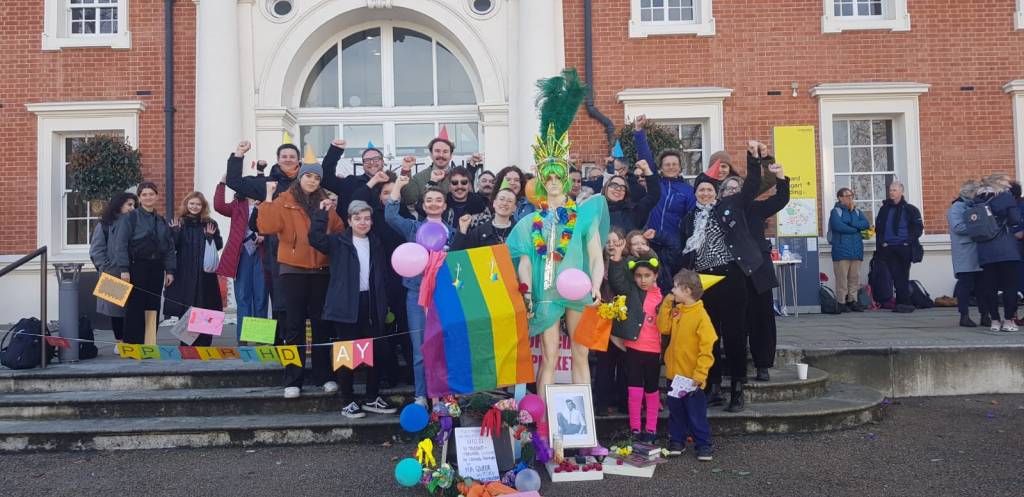Photo credit: Vincent Møystad
As Goldsmiths UCU strikes to prevent 52 workers being made redundant in a ‘restructure’ desired by university management, Goldsmiths lecturer Kiran Grewal speaks on the rationale behind the action
As a lecturer at Goldsmiths participating in yet another round of strike action, I have been asked quite a lot recently what the strikes are about. I often take a deep breath, sigh and don’t know where to start. Given that we are in so many disputes, struggling on so many fronts from the local to the national (and indeed global) and against processes that are as complicated as they are destructive, where do I even begin? So perhaps it is best to start with a story.
On Wednesday I attended – or should I say tried to attend – a meeting that perhaps captures what is at stake in this current moment of ‘crisis’ at the heart of Goldsmiths (in the midst of mass strike action by 68 universities across the country). The meeting was to be an ‘away day’ for Goldsmiths Council (the overarching governing body made up of a range of internal and external members of College) and Academic Board (the representative body of academic staff). Our agenda: to discuss ‘Goldsmiths in 2033’. For many academic staff in the midst of such an untenable and unjust current situation, the brief itself was an insult and they reasonably refused to participate. For me, I felt it was important to be in that room: to hear the discussion, to represent the voice of all those whose contributions to the College now and in the future are being systematically ignored and to have my own concerns recorded, however tokenistic that might seem.
“What does this tell us about the ways different interests in the College are seen and treated? How does holding a banner of protest outside a meeting that determines the future of your workplace make you an illegitimate member of the conversation?”
My efforts did not get off to a good start. Because I had stopped to speak to my friends and colleagues who were peacefully holding banners outside Senate House – a building they have a right to access as members of the University of London community – I was classified a ‘protestor’ and denied entry to the building and the meeting. If I had any doubts before about going into the meeting, at this stage I was adamant. As an elected representative of staff on the College’s governing body I was entitled to at least a seat at the table deciding our futures. I insisted they went and got an organiser from the meeting to let me in.
What does this tell us about the ways different interests in the College are seen and treated? How does holding a banner of protest outside a meeting that determines the future of your workplace make you an illegitimate member of the conversation? Especially when the effort required to forfeit pay, trapse across London and stand in the rain is primarily a display of love to the institution with very little personal gain to be had? How did that become a suspicious and deviant response? A cause to ignore rather than to listen to?
The students’ speech at today’s storming of Senate House. They highlight the human cost of @FCorner‘s reckless restructure of @GoldsmithsUoL, the gaslighting behind the “deficit” and how these plans will effectively kill the soul of Goldsmiths. Video 1/3
#StormingOfSH #GoldStrike
The speech continues to address the mental health impacts of @FCorner‘s restructure on staff and students alike. #StormingOfSH #StudentVoicesMatter #GoldStrike
The students totally NAIL the ideological flaws and blatant tokenism of the restructure. #StormingOfSH #StudentVoicesMatter #GoldStrike 💪✊❤️💕
Originally tweeted by Goldsmiths UCU (@GoldsmithsUCU) on February 17, 2022.
I did get into the room. I was politely greeted by the Chair of Council, I got my lunch and took my seat at a table. The welcomes began and the meeting got underway. For 5 minutes. It was then disrupted by a huge kerfuffle at the door and a group of students managed to wrestle their way into the room. What followed was perhaps the most graphic display of what our dispute is about but also why we seem to be at such an impasse (you can see some of the footage above). While students read out statements of solidarity for the staff who had received emails stating their roles faced ‘deletion’ (the exact wording) – trying to humanise the physical, emotional and financial toll this has taken – those around the tables looked at their phones, sent emails on laptops, munched on biscuits and studiously avoided eye contact. Why? Why can’t we at least have the grace to confront this human cost even if we see it as ‘necessary’?
When another student read out a student testimonial, asking what message was being sent to Black and Queer communities when it was Black and Queer History programmes that were being cut, the turned backs of Council members tasked with making Goldsmiths live up to its ‘social justice’ brand were poignant. This was seen as naïve nonsense in the face of ‘external realities’ that required change. When the meeting was ultimately cancelled and all of us escorted to ‘safety’ out of the building, I heard the tutting, the mutters of ‘stupidity’ and ‘immaturity’ and even an angry outburst at students by a middle-aged man who pushed their flyers away and told them he was sick of their childishness. It clearly made more sense to him to spend 3 hours listening to a range of ‘higher education experts’ (CEOs of organisations whose work is so opaque even those of us working in universities for decades have no idea what they actually do) than the stories of those who make up the daily reality of university life.
This is what it has come to: to name human experiences and vulnerabilities and suggest they should be given recognition and value is a sign of stupidity. Being ‘realistic’ is the outsourcing of our future to consultants and ‘experts’, rather than listening to those who have and continue to build and sustain our little communities: dismantling programmes and initiatives cultivated over many years aimed at addressing racial, sexual and other forms of injustice, all in the name of building the Goldsmiths ‘brand’ of racial and social justice. The destruction of all that makes Goldsmiths unique – its reputation for critical, radical, creativity – in the name of making it unique(ly marketable). The hypocrisy is breathtaking.
“Our strikes are seeking to address many concrete concerns: at Goldsmiths redundancies, the downscaling of pay for many administrative staff members, the restructuring of programmes to take away academic freedom and innovation and the creation of ever more unsustainable working conditions.”
Having participated in so many conversations over the last few years with so many different “stakeholders” at Goldsmiths, I can vouch for the fact that no one disputes the need for change. For many of us, the working conditions have become unbearable. The pressures too much. Students commit themselves to huge debt to come to an institution that I am sure many perceive as poorly run, indifferent and exploitative. Meanwhile, so many of the vibrant, community and student-focused activities we try to maintain, happen in spite of the institution rather than thanks to it. Yet we are now in a situation where those of us who have spent years actually in classrooms are assumed to know less about what makes a classroom accessible than a retired financier (a conversation I have actually had!). Whose version of ‘the real’ are we talking about?
The problem is we are operating on two fundamentally different logics. One demands that we be ‘realistic’ and conform to the current system. A system that the American scholar Wendy Brown has argued is the reduction of all forms of social and political value to a narrow economic calculation of profit maximisation. The other demands that in a context of serious economic, political and environmental crisis we need to be ‘realistic’ about how far neoliberal economic rationality can take us. What do we think will come next? And do those who are currently in charge have the imagination, desire or ability to respond?
Our strikes are seeking to address many concrete concerns: at Goldsmiths redundancies, the downscaling of pay for many administrative staff members, the restructuring of programmes to take away academic freedom and innovation and the creation of ever more unsustainable working conditions. Across UK universities we are making a desperate bid to hold onto pensions and address the inequalities that continue to shape different employees’ working lives as a result of race, gender, disability. Not only has the academic union UCU voted overwhelmingly for strike action, the union that represents most of the other employees of the university UNISON has also now voted to join us: an indication of how widespread the discontent is.
But there is also something else at stake that extends beyond these very important material struggles. We are in a battle over ‘reality’: the real world we can and want to see. Which is why, even though many of us are exhausted, dispirited, disillusioned and despairing we also can’t give up.
Kiran Grewal is a Reader in Sociology at Goldsmiths, University of London where she convenes the MA in Human Rights, Culture and Social Justice. Originally a lawyer, Kiran has become increasingly disillusioned with formal institutions and over the last 10 years has been working with feminist and other activist collectives in Sri Lanka. Together with friends she has established the New Social Imaginaries project: decolonial.org. Kiran’s research focuses on decolonial and subaltern approaches to rights, justice and democracy. She tweets @kirankgrewal
If you enjoyed reading this article and you got some benefit or insight from reading it donate to keep Media Diversified’s website online
Or visit our bookstore on Gumroad – you can donate there too! We are 100% reader funded.










Leave a comment